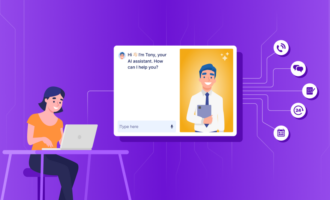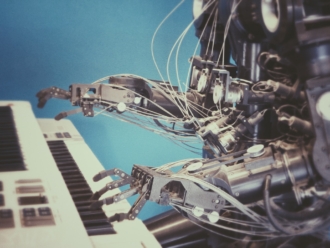Key Takeaways
- Autonomous AI agents work independently, making decisions and completing tasks without human input.
- Key features include autonomy, adaptability, tool integration, and multi-sensory data processing.
- Industries use AI agents for automation, including healthcare, logistics, finance, and customer support.
- Jotform AI Agents streamline data collection, automating customer interactions without coding.
Consumer-facing artificial intelligence tools have burst onto the scene in recent years, streamlining business workflows and increasing productivity. However, many of these tools require careful and strategic prompts from users. Without direct supervision and guidance, the tools aren’t capable of achieving a specified goal.
This isn’t the case for autonomous AI agents. In this article, we delve into this groundbreaking technology and show you how it’s transforming industries and workplaces.
What are autonomous agents?
An autonomous AI agent is a type of artificial intelligence technology that can make decisions and perform actions independently to achieve a goal. Unlike some AI tools that require frequent prompts, autonomous AI agents complete complex tasks on their own, using large language models (LLMs) to understand and learn from their environment.
“When given an objective, these agents break it down into smaller, manageable tasks. They use memory to keep track of past actions, learning from what they’ve done to refine their approach,” says Rob Stevenson, tech expert and founder of BackupLABS, a provider of data protection and backup solutions.
“This process allows them to prioritize tasks and focus on what matters most. They can also access real-time data from the web and other sources, which helps them adapt to changing circumstances. This approach makes them more capable than traditional chatbots, allowing them to carry out difficult operations with little human oversight.”
Pro Tip
Enhance customer service by including an AI phone answering system. Streamline customer service and boost operational efficiency effortlessly!
How do autonomous agents work?
As with most technology solutions, autonomous AI agents range in complexity: Some are straightforward systems designed to complete a predefined task within the confines of their environment, while others are more complex, able to learn from and adapt to evolving situations.
Not all autonomous AI agents do the same things or work in the exact same way, but they all begin when a user (or a software system) establishes a goal and provides it to the AI agent.
How does an autonomous AI agent work from there? Let’s look at a general overview of the process:
- It creates a work plan. The AI agent breaks down the steps it needs to complete in order to achieve the desired goal.
- It processes information. The AI agent gathers data from user inputs and external sensors to make decisions. Some agents also use web searches, conversation logs, and integrations with other software and AI agents to gather information.
- It makes decisions. Using machine learning, rule-based systems, and other decision-making models, the autonomous AI agent considers what it needs to do to complete each task on its path toward achieving the goal.
- It implements tasks. The autonomous AI agent completes each task using the data it’s gathered. If there are any issues with completing the goal, it can problem-solve in different ways to arrive at a solution.
- It adapts and evolves. After achieving the goal, the autonomous AI agent reflects on its learnings and uses that information to improve its performance for the next, similar process.
What are the benefits of using autonomous AI agents?
What advantages can autonomous AI agents offer your organization? Adrien Kallel, CEO and cofounder of Remote People, a global recruiting agency, shares the key benefits:
- Efficiency: Autonomous AI agents handle repetitive tasks, freeing up time for employees to focus on strategic initiatives. In sales, for instance, they can automate lead generation and follow-ups, making the whole process faster.
- Scalability: With autonomous AI agents, organizations can easily take on more work without needing additional human support. For example, in healthcare, AI agents sift through medical data quickly, helping medical professionals make decisions faster.
- Cost savings: Autonomous AI agents can complete many tasks at a fraction of the cost of hiring people.
- Improved performance: Over time, AI agents get better at what they do by learning from their past actions and feedback mechanisms. This makes them more efficient and accurate with each use.
What are the top features of autonomous AI agents?
Autonomous AI agents have specific features that set them apart from other types of AI technology:
- Autonomy: As their name suggests, autonomous AI agents can make decisions and undertake tasks on their own without the need for user prompts at every step. They also automate business operations. “AI agents are good at automating everyday workflows. Whether it’s scheduling, managing projects, or responding to customer inquiries, these agents handle the routine work for you,” says Kallel.
- Memory storage and learning: Many autonomous AI agents learn from their environment, past workflows and tasks, sensors, and feedback mechanisms, getting better at their jobs with time. “This is great for tasks like customer support, where knowing a client’s history makes a big difference,” says Kallel.
- Adaptability: Autonomous AI agents can “think” of ways to adjust to obstacles and issues that stand in the way of them achieving their goals. The tools can respond to changing environments and dynamic situations with ease.
- Tool integration: “Many AI agents can connect to third-party apps and tools, making it easy to add them to your existing systems and automate even more,” says Kallel. The tech can also integrate with web tools and databases to gather additional data from which to make decisions.
- Broad sensory input: Most autonomous agents can gather the information they need from various sources and learn from text, images, video, audio, and other data formats.
What are the top autonomous AI agents?
The market for AI agents is growing, with plenty of tools that help organizations streamline their workflows and enhance results for customers. Here are five tools to try:
- Jotform AI Agents: If you’re looking for a way to streamline data collection, customer support, and customer conversations without having to do any coding, Jotform has you covered. Customize an existing agent, turn a form into an agent, or build an agent from scratch. You can easily train the AI with your documents and information and customize it using Jotform’s AI Agent Builder.
Build Your Custom AI Agent in Minutes
Get Started Now- AutoGen: “Developed by Microsoft, AutoGen is known for creating powerful, multi-agent systems that can handle complex jobs,” says Kallel. “It’s great for software development and research.”
- AutoGPT: This tool helps you create AI assistants and agents to complete workplace processes without human input. “It can quickly break down objectives into tasks without user intervention,” says Stevenson.
- AgentGPT: “This tool allows users to configure and deploy agents easily, making it accessible even to those without technical backgrounds,” says Stevenson. It’s also a good choice for technical users because it can support complex decision-making and tasks.
- CrewAI: “This platform is all about creating teams of AI agents to handle tasks like content creation and business planning,” Kallel reports. “It’s flexible and integrates with other tools, which makes it very popular in research and planning.”
- LangChain: If you’re interested in creating chatbots and automated workflows, this is a good choice. “It’s used to build AI systems that can remember past actions and stay focused on long-term tasks,” Kallel says.
How have AI agents revolutionized industries?
From solving complex problems to automating workflows to operating in multiple languages, autonomous AI agents support a range of industries. For example, with the Jotform AI Agent templates, organizations can create AI agents to support administrative and data-collection processes for virtually any scenario.
| Industry | Autonomous AI agent objectives | Benefits to industry |
|---|---|---|
| Healthcare | Processing administrative records, analyzing information, and supporting decision-making | Enhanced patient outcomes and streamlined customer service and administrative processes |
| Software development | Writing and refining code | Increased efficiency and accuracy |
| Education | Keeping parents and students up to date with assignments, class schedules, events, and more | Improved parent satisfaction and communication with students |
| Logistics and supply chains | Managing stock levels and automating orders | Streamlined operations and reduced expenses |
| Sales and marketing | Assisting with lead generation, customer support, and data analysis | Enhanced customer satisfaction and higher revenue |
| Finance | Detecting fraud | Improved risk management |
| Real estate | Sorting through real estate listings, filtering by customer preferences | Enhanced customer satisfaction and increased efficiency |
| Transportation | Creating efficient routes and determining best refueling opportunities; operating self-driving vehicles | Optimized delivery times |
What will autonomous AI agents do in the future?
Autonomous AI agent technology is just getting started — we’re going to see it evolve and grow considerably in our lifetime.
“Agents will get better at teaming up, sharing tasks, and solving bigger, more complex problems together,” says Kallel. “Agents will become more reliable when it comes to managing long-term projects and will get better at keeping track of tasks that take days or weeks to complete.”
“The future of autonomous AI agents looks bright,” says Stevenson. “Their ability to learn and adapt will get better, making them even more useful.” With daily advancements in AI algorithms and machine learning, the potential for autonomous AI agents is virtually limitless.
Photo by Ryan Snaadt on Unsplash


























































Send Comment: